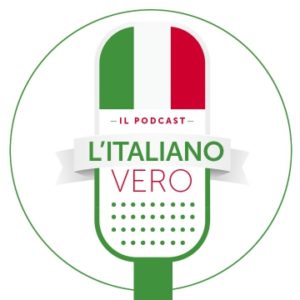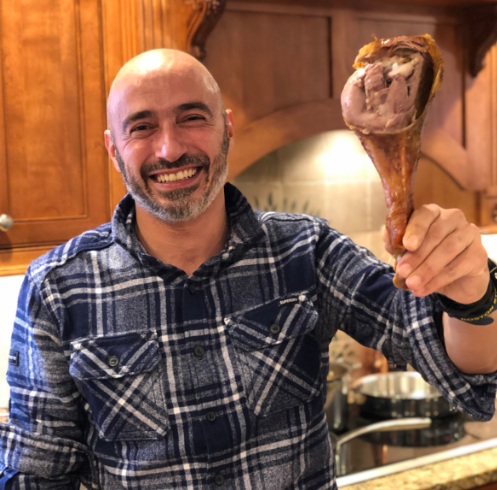Blog in Italiano
In questo episodio intervistiamo Massimo chiamato dagli amici Cubo l’ideatore del podcast l’italiano vero.
Gli chiediamo il perché ha deciso di fare un podcast è quale parte della lingua intende trattare durante gli episodi.
Massimo tra le altre motivazioni ci trasmette un messaggio positivo (appreso durante il suo periodo di permanenza all’estero) dal libro Le Vostre Zone Erronee, Fare cose per il puro gusto di farlo senza temere di fallire.
Enrico, suo amico, ospite della puntata gli fa un divertente quiz per scoprire se è ancora “Un Italiano Vero” o è diventato più americano vivendo all’estero.
Massimo è nato a Montella in casa non in ospedale e vive a Bergamo, città famosa nel mondo per l’acqua San Pellegrino, e per essere il luogo dove è stata inventato il gusto del gelato, la stracciatella.
Parliamo dei modi di dire:
- “prenderla alla larga” :È un’espressione idiomatica che si usa per descrivere un discorso iniziato in modo indiretto, che si dilunga in argomenti marginali, prima di giungere al punto saliente; si utilizza anche per indicare un’azione dove si perde tempo, si procede lentamente prima di adempiere un compito.
- Fare strada: (fonte https://dizionari.corriere.it): Accompagnare qualcuno, guidarlo precedendolo nella direzione o nel luogo in cui desidera andare, per insegnargli così il cammino o per semplice atto di cortesia. In senso figurato, fare in modo che non incontri ostacoli e difficoltà.
Facciamo un breve role play di una come ci si può’ presentare in Italia in un ambiente di lavoro.
Si possono usare frasi per rompere il ghiaccio:
- Chiedere di “darsi del tu”, (Fonte: La forma del Tu è colloquiale e si utilizza tra persone che hanno confidenza tra di loro, oppure tra persone che – di reciproco accordo – stabiliscono una relazione paritetica), al fine di accorciare le distanze ed entrare in maggiore confidenza con l’interlocutore.
- Parlare del traffico.
- Offrire un caffè alla “macchinetta del caffè” un modo da Italiano vero per chiamare i distributori automatici.
Blog in English
In this episode, L’Italiano Vero interviews Massimo (known among his friends as Cubo). Massimo is the creator of L’Italiano Vero. We ask him why he decided to make a podcast about language and how he intends to structure the episodes around learning real Italian. Massimo provides a positive message (learned from his experiences abroad), but also inspired by the book, Your Erroneous Zones: do things for the sake of doing it, without the fear of failure.
Enrico, Massimo’s friend and host of the episode, gives Massimo a funny quiz to find out if he is still “un Italiano vero” (a true Italian), or if he has become more American from his stays abroad.
Massimo was born in the home of his family in Montella, and now lives in Bergamo, a city famous worldwide for the water of San Pellegrino, as well as the ice cream flavor, stracciatella. The flavor is a milk-based ice cream with fine, irregular shavings of chocolate. The name, “stracciatella” means “little shred” in Italian and references the chocolate.
Let’s talk about some expressions:
- “prenderla alla larga” means “take it wide:” It is an idiomatic expression that is used to describe a discourse that has started in an indirect way, which lingers on marginal arguments before reaching a salient point. It is also used to indicate an action where time is lost because one proceeds slowly before fulfilling a task.
- “Fare strada” means “leading the way:” This refers to accompanying someone, guiding them in the direction or in the place where they want to go, teaching them the way or assisting them as a courtesy. In a figurative sense, it means to offer assistance to make sure that someone does not encounter obstacles and difficulties.
Now, let’s do a brief role play with one of the expressions. Let’s try to use it in a work environment scenario set in Italy. You can use the phrase to break the ice:
- Ask to “darsi del tu” or “to give yourself:” The form of tu is colloquial and is used between people who are familiar with each other, or between people who—by mutual agreement—establish a joint relationship, in order to enter into a greater confidence with the interlocutor.
- “Parlare del traffico” or “talk about traffic”
- To “offrire un caffè alla “macchinetta del caffè” or to “offer a coffee at the coffee machine;” “macchinetta del caffè” is the real Italian way to refer to vending machines.
 Settembre 9, 2019
Settembre 9, 2019 24 min
24 min Luglio 29, 2019
Luglio 29, 2019 13 min
13 min Luglio 15, 2019
Luglio 15, 2019 24 min
24 min Luglio 1, 2019
Luglio 1, 2019 15 min
15 min Giugno 17, 2019
Giugno 17, 2019 21 min
21 min Maggio 30, 2019
Maggio 30, 2019 29 min
29 min Maggio 9, 2019
Maggio 9, 2019 21 min
21 min Aprile 30, 2019
Aprile 30, 2019 28 min
28 min Aprile 17, 2019
Aprile 17, 2019 15 min
15 min Aprile 10, 2019
Aprile 10, 2019 24 min
24 min Aprile 3, 2019
Aprile 3, 2019 24 min
24 min Gennaio 26, 2020
Gennaio 26, 2020 21 min
21 min Gennaio 12, 2020
Gennaio 12, 2020 20 min
20 min Dicembre 29, 2019
Dicembre 29, 2019 24 min
24 min Dicembre 15, 2019
Dicembre 15, 2019 21 min
21 min Dicembre 1, 2019
Dicembre 1, 2019 12 min
12 min Novembre 17, 2019
Novembre 17, 2019 min
min Novembre 3, 2019
Novembre 3, 2019 20 min
20 min Ottobre 20, 2019
Ottobre 20, 2019 14 min
14 min Ottobre 7, 2019
Ottobre 7, 2019 9 min
9 min Settembre 23, 2019
Settembre 23, 2019 33 min
33 min Gennaio 9, 2024
Gennaio 9, 2024 6 min
6 min Dicembre 2, 2022
Dicembre 2, 2022 31 min
31 min Ottobre 8, 2022
Ottobre 8, 2022 18 min
18 min Dicembre 25, 2021
Dicembre 25, 2021 1 min
1 min Settembre 18, 2021
Settembre 18, 2021 21 min
21 min Agosto 14, 2021
Agosto 14, 2021 17 min
17 min Maggio 4, 2020
Maggio 4, 2020 32 min
32 min Aprile 12, 2020
Aprile 12, 2020 41 min
41 min Agosto 26, 2019
Agosto 26, 2019 18 min
18 min Agosto 12, 2019
Agosto 12, 2019 11 min
11 min Giugno 5, 2019
Giugno 5, 2019 9 min
9 min






Leave a Comment